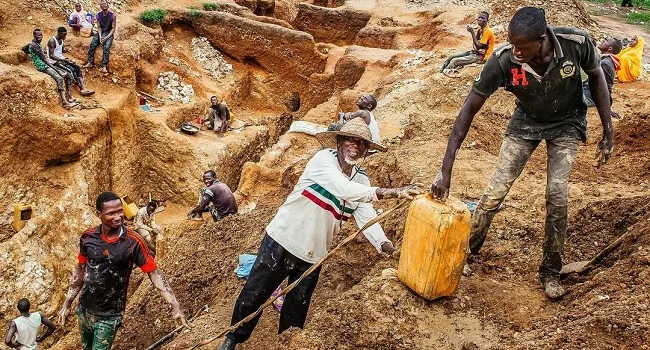Nigeria’s solid minerals sector attracted over $800 million in processing projects in 2024 and generated more than ₦38 billion in revenue, up from just ₦6 billion in the previous year, despite receiving only 18% of its ₦29 billion budget allocation.
Minister of Solid Minerals Development, Dr. Dele Alake, disclosed these figures during a feature interview for an upcoming State House documentary marking President Bola Tinubu’s second anniversary in office.
Alake attributed the sector’s rapid growth to the administration’s policy shift towards local value addition and stricter licensing regulations. “No miner receives a license without a clear local processing plant. The days of exporting raw minerals from pit to port are over,” he emphasized.
Key investments include a $600 million lithium processing plant near the Kaduna-Niger border, set to be commissioned in Q2 2025, a $200 million lithium refinery on Abuja’s outskirts nearing completion, and two more processing plants in Nasarawa slated for commissioning before Q3 2025.
“From ₦6 billion annually when we resumed, the sector hit ₦38 billion by the end of 2024—achieved with just 18% of our budget released. This demonstrates the effectiveness of our reforms,” Alake said.
In Q1 2025, the Mining Cadastral Office and the Mines Inspectorate recorded revenues of ₦6.9 billion and ₦7 billion respectively. The sector’s 2025 budget includes ₦1 trillion for mineral exploration, aimed at generating internationally certified geological data crucial for attracting serious investors.
“Previously, Nigeria spent only $2 million on exploration, compared to $40 million in Sierra Leone and over $300 million in South Africa. Exploration underpins investor confidence,” the Minister noted.
Alake also highlighted ongoing efforts to combat illegal mining and formalize artisanal miners. Over 300 illegal miners were arrested in 2024, with 150 prosecutions underway and nine convictions secured, including of foreign nationals. More than 250 mining cooperatives have been established to integrate informal miners into the formal economy.
Nigeria now chairs the newly formed African Mineral Strategy Group, pushing for local value addition and fairer mineral trade across the continent—a direct outcome of Nigeria’s leadership at the 2024 Future Minerals Conference in Riyadh.
Reflecting growing international interest, Alake revealed high-profile engagement from the UK, US, Saudi Arabia, and UAE, particularly regarding Nigeria’s lithium resources.
“The former British Deputy Prime Minister invited me to Downing Street to discuss UK investment in Nigerian lithium. The US is also keen to diversify away from China and sees Nigeria as a viable alternative,” he said.
With tightened regulation, robust revenue growth, and rising foreign direct investment, Nigeria’s solid minerals sector has become a cornerstone of the Tinubu administration’s economic diversification agenda.
“The mining sector has never been this vibrant. We’re restoring confidence, building data, enforcing laws, and returning value to Nigerians from their resources. Over 10,000 local and foreign investors applied for licenses this quarter alone—an unprecedented level of interest,” Alake concluded.


